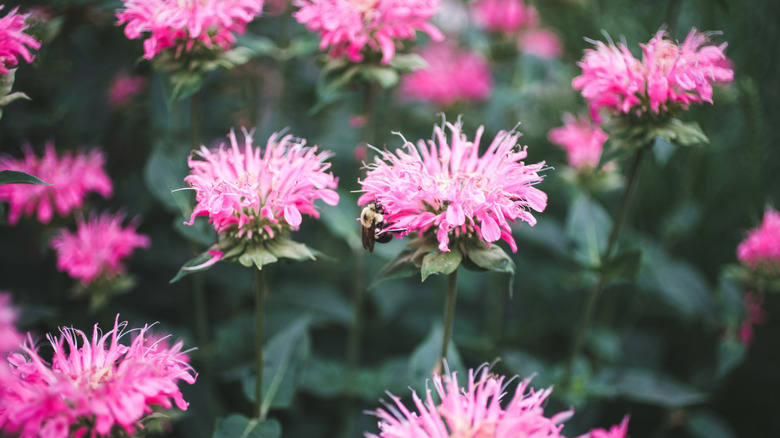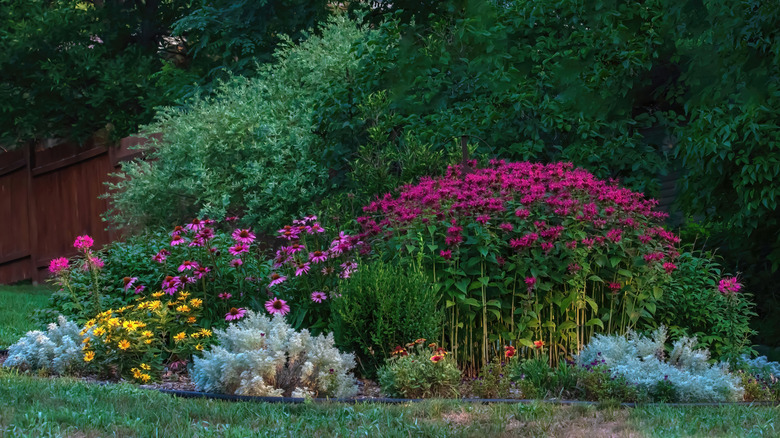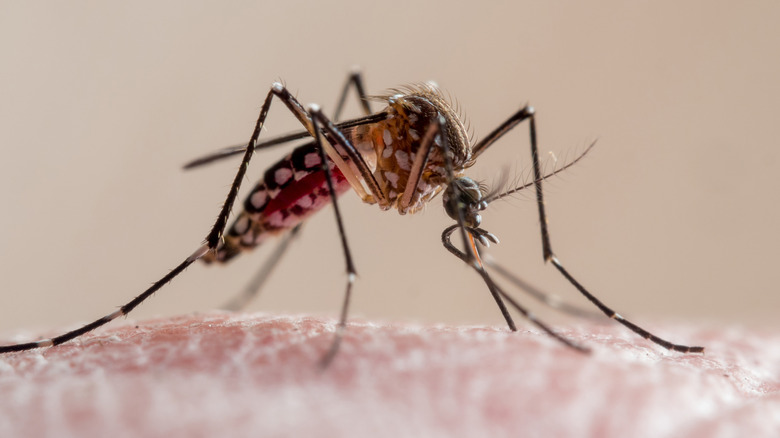The Aromatic Flowering Herb That May Help Keep Mosquitoes Away From Your Garden
Nothing ruins a backyard bonfire or happy hour on the patio quite like mosquitoes. Not only do these pesky insects leave itchy welts when they bite, they're also known to transmit diseases. While bug sprays work to deter these pests, they often require the use of chemicals which come with their own problems. That's where all-natural repellents like fragrant plants are key.
Mosquitoes have a strong sense of smell, which they use to find hosts. Using receptors on their antennas and on and around their mouths, they're able to smell and locate humans and animals to feed on. This olfactory system is also what helps mosquitoes avoid smells they don't like such as strong-smelling herbs.
Bee balm (Monarda didyma) is one such pungent herb that helps repel mosquitoes and perfume your garden. Not only does this flowering perennial deter mosquitoes, it is also deer and rabbit tolerant, it attracts pollinators, and it adds a touch of whimsy to your garden. Additionally, you can eat the blooms and leaves of the bee balm plant and use the petals for tea.
Growing bee balm in your garden
Bee balm is a native plant with more than a dozen varieties found throughout North America. The plant thrives in USDA Hardiness Zones 3 to 9 and blooms in June and July. These tall plants can reach heights of 3 to 5 feet, topping their growth with clusters of flowers in red and pink hues. In some cases those blooms appear in shades of white or purple.
Wild bee balm is usually found dotting meadows and marshes, and does well in backyard rain gardens because it loves moist soil. Its main weakness is a predisposition to powdery mildew, which tends to crop up if the plant is overcrowded. Keep this in mind when planting bee balm in your beds as the plant is known to spread quickly year over year.
Planted in the right spot in your yard, bee balm doesn't need a ton of care unless you're experiencing drought. In that case, be sure to supplement with regular waterings when the soil gets dry. Mulch can help the soil retain moisture. As blooms die, you can deadhead to prep the plant for the next season, but fertilizer isn't typically required.
Why mosquitoes dislike bee balm
Studies classify mosquito repellants into three categories: smells mosquitoes dislike and therefore avoid, smells that mask human smells, and smells that draw mosquitoes away from humans to other places. As a mosquito hunts, it uses the smell of skin as well as exhaled CO2 to locate humans and animals. When it comes to bee balm and other mosquito repellant plants that actually work, the plant's strong aroma is what deters the insect. And it's effective. Studies show that essential oils work as well or better than chemical options such as DEET to repel mosquitoes. Some experts say you'll have better luck crushing up various plants, including bee balm, and wiping the plant's oils on your skin so long as you don't have an allergic reaction
Some gardeners refer to bee balm as horsemint given its minty, citrusy fragrance. Unlike other herbs, you don't have to crush up bee balm leaves to catch a whiff of its strong odor meaning mosquitoes can smell it where it's planted. You can enjoy the protective qualities of bee balm in your own yard by planting it alongside other mosquito repelling plants either in beds or pots. Mosquitoes love standing water and hate wind, so if you can remove the former from garden pots and low spots in your yard and add the latter with a fan, you'll optimize the effects of bee balm.


